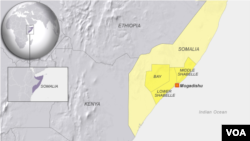In recent days, al-Shabab fighters killed individuals accused of collaborating with the African Union Mission in Somalia (AMISOM) in the town of Marka after the international force withdrew.
Al-Shabab posted pictures of the body of at least person labelled “collaborator” riddled with bullets. In September last year a local elder was abducted by al-Shabab in Awdhegle shortly after AMISOM and government troops pulled out. He has not been seen again. In June the same year when al-Shabab took over Leego, the town’s chairman was apprehended and beheaded by militants.
Sunil Suri, of the London-based NGO Saferworld, said the current approach to fighting al-Shabab has not benefited ordinary civilians.
“A military approach is meant to provide security, but then security for who? When we think about the withdrawal of Marka a collaborator gets killed, that is not security for that person who helped AMISOM and the government structure of that town,” he said.
Suri said the AU mission has not been effective in terms of ensuring the Somali peoples’ security needs are met. Instead, he argues, international security concerns are often prioritized.
The former Governor of Lower Shabelle Abdulkadir Mohamed Nur lamented the withdrawal of AMISOM and government troops from towns in his region.
“We move into town only to withdraw when people start to come out of their shell,” Nur said.
Suri warns that al-Shabab won’t be defeated by a militarized approach led by AMISOM and the Somali national Army.
The International Crisis Group this week said the reason for al-Shabab’s recent success is that the militant group “has not been defeated politically and socially” in parts of Somalia.
ICG says the military offensive against al-Shabab can only achieve progress “within durable political settlements.”
“The paramount focus should be on addressing local Somali political grievances, not on regional or international priorities. Tapping into the grievances of local communities is what enables al-Shabaab to remain and rebuild in Somalia,” ICG said.
Suri says the AU mission needs to reinforce people’s security first.
“AMISOM should have a clear and explicit mandate from the United Nations Security Council to protect or provide immediate security to civilians in areas taken from al-Shabab,” he said.
Leaders of AMISOM and military chiefs of troop contributing countries this week met in Nairobi, to discuss the situation on the ground. The Head of the AU Mission Ambassador Francisco Madeira defended AMISOM’s strategy and achievements.
“The most significant indication yet that our efforts have borne tangible results is the decision made by the Federal Government of Somalia on the electoral model to be used in the coming elections later this year,” Madeira said.
Madeira indicated he understands, that despite the terrorism challenges posed by al-Shabab, the AU mission also needs to win the support of the locals to succeed.
“Robust military action must go hand in hand with an equally robust, inclusive and effective political reconciliation process to win the hearts and minds of the population,” he said.





